Manchester United manager Erik ten Hag has clarified his decision to place Marcus Rashford on the bench during the team’s recent fixture. The move, which caught the attention of fans and pundits alike, was part of a strategic rotation aimed at maintaining both the player’s and the team’s overall freshness amidst a congested fixture schedule.
Rashford’s Role in Rotation Strategy
Marcus Rashford, an attacker for Manchester United and an England international, has been a key player for the club in the Premier League. However, in a recent statement, Ten Hag revealed that his decision to not start Rashford was deliberate and tactical. “I decided for Marcus Rashford on the bench for rotation to keep him and the team fresh through a busy period with another big game on Sunday,” explained Ten Hag. This strategy highlights the manager’s approach to player management and squad rotation during periods of intense match schedules.
Impact on Team Dynamics
The decision to rotate players, especially key figures like Rashford, is a common practice among football managers. It serves to prevent fatigue, reduce the risk of injury, and ensure that the team remains competitive across all fronts. With Manchester United competing in multiple competitions, such strategic rotation is crucial for maintaining the squad’s performance levels.
Looking Ahead
As Manchester United prepares for their upcoming fixture on Sunday, fans will be keen to see how Ten Hag’s rotation policy unfolds and whether Rashford will be reinstated to the starting lineup. The manager’s approach to squad management will continue to be a topic of interest, especially as the team navigates through the demanding schedule of the Premier League and other competitions.

